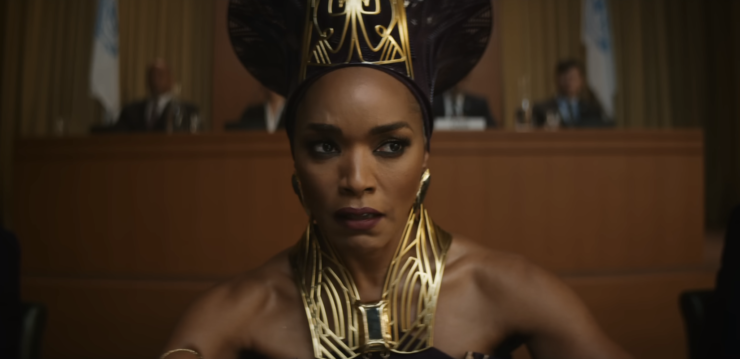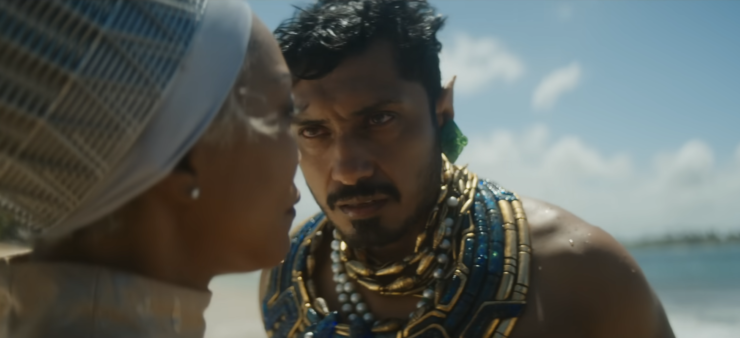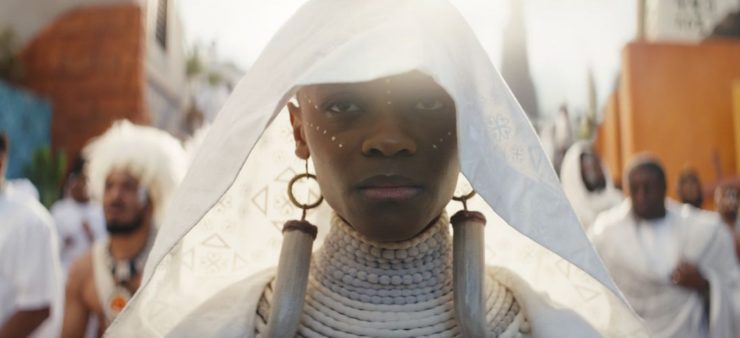Since the start of the pandemic, I’ve only ventured into the theater once for a movie: Nope. Wakanda Forever lured me out again. I put on a white shirt and donned a white mask and spent nearly 3 hours completely engrossed. I cried twice and cheered out loud even more. So far Phase 4 has been hit or miss, but this film makes it all worthwhile.
Major spoilers ahoy.
Chadwick Boseman’s spirit looms large over the film. Personally, I’m glad, for so many reasons, that they did not recast T’Challa or go the CGI route. It’s no secret that Ryan Coogler did massive rewrites on Wakanda Forever after his death; it originally featured T’Challa and Namor going at it as warring heads of state, with Boseman’s plot now being divvied between Queen Ramonda and Shuri. Grief runs through every single frame. The movie begins and ends with Shuri grappling with T’Challa’s death and what comes next.
We’ve seen grief in the MCU before. WandaVision spent nearly 9 hours mourning a character who wasn’t all that interesting in the first place and trying to make the audience feel bad for a woman who basically enslaved an entire town. (It was fun, but far from my favorite MCU TV installment.) But this movie doesn’t try to pick grief apart or rationalize it. It lets the characters feel it, live it, breathe it, sink into it, and finally drag themselves out of it. It permeates every act from every character. It is why Namor chooses war over conversation, why Shuri chooses revenge over compromise, why Nakia chooses to build a new life with her son in Haiti instead going home to Wakanda, why Queen Ramonda chooses her daughter over her people, even why M’Baku puts himself forward as an older brother figure to the princess instead of an adversary.
Grief can make you say or do awful things, something we see time and again here. Shuri has a lot of blood on her hands from her hastily slapped together ship plan. A better leader would have allowed her underlings to poke holes in her plan in order to weave together a stronger one, because it was so obviously going to be a struggle. Shuri defeated Namor not with her intelligence, cunning, or strength but with sheer luck. Numerous Wakandans died so she could fill the hole her grief left in her heart. There’s a big difference between people willing to give their lives to fight beside the leader who protects them and people who are led to slaughter because of one all-powerful person’s uncontrollable emotions. Say what you will about that mid-credits scene, but I think M’Baku challenged Shuri for the throne more because he believes his leadership is what’s best for Wakanda, rather than anything personal against the princess. (You can see him make the decision earlier in the film when he grunts his acquiescence to a plan he doesn’t fully agree with.) In Wakanda, we see how tenuous their political system really is. Put a weak, impetuous, or emotionally reckless figure at the top and the whole thing wobbles. Choosing a leader based on nothing other than they’re related to some guy who happened to find a magic plant is not a recipe for long-term stability.

Even Namor poses problems for his people, whether they realize it or not. He has no council to advise him of other options or push back on him—after all, you can’t say no to a god. He thinks only of the immediate response, not the long-lasting results. Say he does declare war on the surface world, then what? Colonizers will gladly cut off their own noses to spite their faces, so he’s a fool if he thinks they won’t destroy the ocean just to root him out. He may win the early battles, but he’ll lose the war and take his empire down with him. That’s not to say he shouldn’t fight back, just that bad things happen when an entire civilization depends on the whims of one person.
Making matters worse is that Shuri is struggling to fill T’Challa’s ugly-ass sandals. During her communions with Killmonger and her dead mother, they draw a line between “noble” men like T’Challa and “get shit done” men like Killmonger and then demand she choose who she wants to emulate. Will she defend or attack, seek peace or war? But it also shows how little either really understood leadership. Being a good ruler means carrying both. Killmonger, Namor, Ramonda, and Shuri fall too far onto the “get shit done” side while T’Challa would have found his nobility under strain going up against Namor. Shuri makes for a fine Black Panther, but she is clearly not ready to lead a nation.
A lot of ink has been spilled over whether or not Killmonger was right. I maintain that while his ideals were right, they were just a cover to let him enact his petty revenge fantasy. He never truly cared for or believed in his lofty goals; they merely allowed him to rationalize his behavior and prop himself up as a hero. Namor is another take on Killmonger, but he actually has valid reasons for his actions. Knowing that he became a Mutant because Spanish colonizers drove his people off their land, seeing his people brutalized and terrorized, living for hundreds of years carrying the weight of your entire culture and history, knowing that you are the one thing keeping your entire civilization alive, all that takes a toll. He has never been in a position where he could even consider reconciliation.
Wakanda, for better or worse, stood aside and let their neighbors be ravaged. They have a lot to answer for, and it makes sense that Namor prefers a military alliance over a political friendship. Namor sees himself as a savior. He fought back against the colonizers…but then he did exactly what the Wakandans did and built himself an isolated fortress out of vibranium. Only when the one resource they have that gives his people power over the colonizers is under threat do they finally reveal themselves, and even then it’s not to protect the descendants of their ancestors but themselves. Namor’s war against the surface world will kill colonizers and his landlubber cousins alike (and given what we’re seeing with climate change, his Indigenous cousins would likely suffer first and worst). Likewise with the Wakandans. Killmonger’s war ultimately killed T’Challa by denying him access to the Heart-Shaped Herb. And Queen Ramonda and Shuri’s grief hurt their own people more than it did the Talokans. All made choices in the moment driven by their emotions rather than what was best for their people in the long run.
Shuri and Namor are both operating from different positions of power and privilege. In order to win, Shuri has to break Namor’s power by literally and metaphorically putting him beneath her. They don’t leave that beach as equals but as a rising monarch and a fallen god. In how he tries to force the Wakandans to bend to his will for his own personal benefit, Namor is no better than the Spanish who enslaved his ancestors. But in how Shuri strips him of everything and leaves him broken and wanting at her feet, she is also no better than the colonizers. Namor sees Wakanda as a resource to be exploited while Shuri wants to do what Wakanda always does: hide behind espionage and suffer no consequences. Namor forces Wakanda off its pedestal and to acknowledge the harm their actions have caused others, just as Shuri later does to Namor.

Namor and Shuri are more alike than either realize yet are also so very different. Although they trod parallel paths, they each have different needs, wants, and objectives. They have different histories, spiritualities, and cultures. “BIPOC” is not a community but communities within communities intersecting with other communities. This is bigger than right versus wrong, good versus evil. We’re in messy territory, my friends. Coogler’s movie digs much deeper than the typical MCU fare. He asks us to look beyond trite superhero tropes and reckon with how different groups might approach restorative justice, reparations, and retribution.
Beyond the script, Wakanda Forever is a tour de force of talent. The editing, both sound and film, is crisp and emotional. As a director, Coogler knows when to linger and when to move on, when to let silence fill the screen and when to push the characters into a scream. Autumn Durald Arkapaw’s cinematography is gorgeous and textural and holds up even when the CGI gets muddy. The production design and art and set decoration are lush with worldbuilding details and bright colors. Ruth E. Carter once again does Oscar-worthy work with her costume designs, and don’t even get me started on Ludwig Göransson’s stellar soundtrack.
I’m not going to waste time on the white actors. Their roles are important but they’re also the least interesting characters in the plot and the acting is fine to mediocre. Everyone else though? *chef’s kiss* Winston Duke, Angela Bassett, Letitia Wright, Lupita Nyong’o, Danai Gurira, Florence Kasumba, and Michaela Coel are fantastic as the Wakandans, to no surprise. Lupita and Angela especially stand out, with the former’s fascinating character development on Haiti and the latter’s speeches that will leave you breathless. Dominique Thorne is an absolute delight as Riri Williams, aka Ironheart. Her role mirrors a lot of what Sam Wilson and Isaiah Bradley went through—an African American exploited by white political power then discarded when she no longer serves their needs—and Dominique conveys all of that with wit and determination.
And of course, the denizens of the lost city. As the Warrior, Alex Livinalli is impossible to look away from. His battles with Okoye are some of the best fight scenes in the entire movie. He struts and stalks like a man confident in his abilities and eager to show off, but there’s no arrogance or hot-headedness to him. He relishes the art of the fight. Mabel Cadena shines as Namora, with her imposing presence and sharp tongue. On the page, Namora lacks depth, but in Mabel’s hands she becomes a fearsome figure.
Then there’s the powerhouse that is Tenoch Huerta. He commands attention, not just because of his very, very nice looks but his whole vibe. The man can act. Second only to Angela Bassett, he’s the strongest actor in the entire movie. Letitia does a good job, but her scenes with him make it abundantly clear who the real star of the movie is. I wish every casting director and producer in the US and Latin America that shoved him onto the sidelines largely because he’s brown (he has Nahua and Purépecha ancestry) a lifetime of stepping on Legos. If the film industry has any sense, this man will have a long and impressive career.
The things about Wakanda Forever that didn’t work feel less like structural problems and more like the necessary but unpleasant fallout from having to work within the rules of the MCU. The plot is overstuffed and at times the pacing feels off. But also, I kinda don’t care. I walked out of the movie feeling a powerful connection to the Black diaspora. I felt like I had processed something big and came out the other side. The last few years haven’t been easy for a lot of us, but Coogler and co offered a chance at catharsis and community. I can’t wait to watch it again and again and again.
Alex Brown is a Hugo-nominated and Ignyte award-winning critic who writes about speculative fiction, librarianship, and Black history. Find them on twitter (@QueenOfRats), instagram (@bookjockeyalex), and their blog (bookjockeyalex.com).











It is a good, solid movie. I’m surprised how well it worked without the charismatic Chadwick Boseman in the lead. Namor was introduced very effectively, and the actor played the role superbly.
I think M’Baku challenged Shuri for the throne more because he believes his leadership is what’s best for Wakanda, rather than anything personal against the princess.
I don’t agree.
Oh, not about why M’Baku went for the throne; I agree with that part. But I don’t think he was challenging Shuri. The way I read that scene, he challenged anybody else, with Shuri’s support (by her absence). She basically abdicated in his favor.
@3,
Same. That was my take, too.
It basically puts her and M’Baku in the same position/dynamic Comics T’Challa and Shuri were in towards the end of the Hudlin era and into Jonathan Hickman’s Avengers
MCU M’Baku has the political power while Shuri holds the Panther-ship, if you will, and its ceremonial role/power.
If we get a Panther 3, I’m definitely curious if they’re gonna go the route Ta-Nehisi Coates went in his run (Wakanda going through democratic reforms and establishing a constitutional monarchy).
This is one of those works of arts where I think it will be illuminating to discuss it two ways….one in a white dominated audience, and one in a Black and Latine dominated audiences. Because I think it will be educational and deepening of the appreciation of the film to do that.
I definitely saw this movie twice in less than 24 hours because it was just that good. I love how Ryan Coogler gives us the villains who have so much depth. Also, I agree Shuri abdicated to M’Baku because the throne was never her goal. I can’t wait until the next time we see the black panther. Random side note: did anyone else think Namor was high key into Shuri?
@6: During the underwater city sequence, definitely. Tangentially, the pressure suit that Shuri was wearing was obviously loot from the American vibranium prospectors, because why else would Namor’s people have it? I hope they cleaned the blood out of it…
Thank you, Alex for finally saying it. Wakanda was selfish, when it abandoned the rest of Africa because they were afraid they’d lose control of vibranium. I’ve often said that the comeback for “colonizer” should be “abandoner”.
And given what you’ve said about how Shuri was unfit to lead Wakanda (even if a good Black Panther) the movie also fits in with my PROFOUND discomfort that the most advanced nation on the planet was also somehow a (mostly) hereditary monarchy whose only redress for an unsuitable ruler was trial by combat until death.
Terrific write-up. Just a couple notes: The Warrior, as you’ve listed him, is named Attuma.
Also, being Black Panther =/= being the monarch. T’Challa was Black Panther while T’Chaka was king, and only because he was directly in line for the throne did he fill both roles.
Shuri is the Princess and is direct in line to the throne following Queen Ramonda’s death, but Wakanda has shown their challenge rituals for the throne. In the absence of any kind of coronation ceremony, and Shuri’s deliberate skipping out on the ceremony at the waterfall, my reading of that scene was an embrasure of the Black Panther’s protector role and a lack of interest in the throne. M’Baku’s advisory and friendly role with Shuri and his role in both leading his clan and in housing the Wakandans (this is twice now that he’s done it; harboring refugees and rebels following Killmonger’s rule and harboring refugees after Namor’s attack) makes it seem like he might be best suited for the role of King, with Shuri’s tacit approval.
For the third movie in a row, I find myself asking, “WHERE THE HECK ARE THE BATTLE RHINOS?” They were critical to Wakanda’s defense in Black Panther, and they were nowhere to be found in Infinity War, Endgame, or Wakanda Forever. I mean, Namor’s people get to ride around on bit-ass whales, why don’t the Wakandans get to use thir big-ass rhinos?
—Keith R.A. DeCandido
@10 Every comic book movie could use more battle rhinos. :-)
Agreed. MORE BATTLE RHINOS!
@10 if I wanted a Marvel No-Prize for explaining their absence in Infinity War and Endgame, I would postulate that since it was the Border Tribe that trained, maintained, and rode the Battle Rhinos into battle, the loss/incarceration of the majority of their warriors after the events of Black Panther and their falling out of favor within the Wakandan military would leave the remaining Battle Rhinos without trained riders, especially if they’re possibly pair-bonded with their trainers/owners. Even if they started working on training new riders among the other tribes or the remaining non-traitor Border Tribe members, it may have been judged too much effort to shuttle them over to the battlefield in such a small amount of time to try and counter Thanos’ forces (either the initial battle in Wakanda or the final battle at Avengers Campus).
As for Wakanda Forever, the first major conflict was in the middle of the city where parts of it got flooded where I doubt many Battle Rhinos would be wandering about or in secure enclosures. The second major conflict was in the middle of the ocean, and last I checked, rhinos aren’t long-distance swimmers. :)
@6: Namor was totally digging Shuri’s action. I kept expecting him to say, “Marry me, and let us unite our tribes against the outsiders.” (I’m already shipping M’Baku and Namora.)
SPOILER: One of the best artistic decisions in the entire movie comes at the beginning, with the Marvel Studios title cards falling silent as Chadwick Boseman flashes across the screen. No lie, I teared up right then and there. Yes, this is my king.